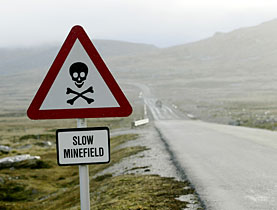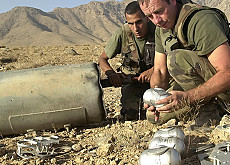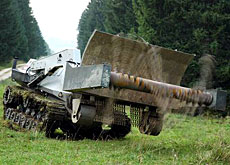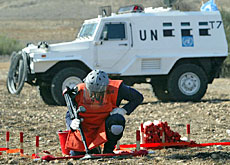“Landmine ban risks losing momentum”

The struggle to rid the world of anti-personnel mines is in danger of losing momentum and needs to be taken more seriously, warn campaigners.
Swiss diplomat Jürg Streuli, who will be presiding at the annual meeting of signatories to the 1997 Ottawa Convention in Geneva in November, advocated firmness but also said he hoped to find tailor-made solutions for countries missing treaty deadlines.
The comments were made on the eve of International Day for Mine Awareness and Assistance in Mine Action, held on Friday.
The Ottawa Convention, now signed by 156 states, was described last year as “success in progress”.
Some 80 per cent of countries have now pledged not to produce, use or stockpile landmines. The global trade in the weapons has virtually ceased.
Just two governments – Burma and Russia – reportedly still use landmines. More than 40 million landmines have been destroyed since 1997 and thousands of square miles of contaminated land have been demined.
Yet campaigners are now warning that the implementation process lacks urgency and transparency, and certain states’ failure to meet deadlines is setting a bad example.
“International Day of Mine Action is normally something of a celebration with progress on clearing landmines and destroying stockpiles,” explained Stuart Casey Maslen, editor of the Landmine Monitor. “There’s good news to report, but the treaty is facing some major challenges.”
Under the agreement, states with mines on their territory are obliged to clear and destroy them “as soon as possible but not later than [within] ten years”.
Deadlines
“The first clearance deadlines are looming in March 2009,” said Maslen. “It was always understood that ten years was going to be realistic for many states, but there were several heavily contaminated states – Afghanistan, Bosnia and Cambodia – where this would not be possible.”
Campaigners bemoan the fact that 16 countries, including Peru, Ecuador, Senegal, Britain (Falklands), Venezuela and Denmark, which “don’t have that excuse”, are unlikely to meet the deadline.
They say there is a danger that in the November meeting these states will call for blanket ten-year extensions and all the momentum built up over the past few years will be lost.
“These are countries with a small manageable problem that should have been cleared by now,” said Maslen. “They are setting a poor example for others just at the time when some donors are starting to say they need to reduce support for mine clearance.”¨
Streuli acknowledged that certain countries could do better.
“With this kind of country we have to remind them that they took an engagement which they have to fulfil,” he said.
He also underlined how urgent it was to maintain funding for demining.
“Demining is a very costly affair and some countries will say they can only do it if they get more money. The problem is that today antipersonnel mines are much less in the public eye,” he said.
Stockpiles
Another predicament surrounds the destruction of stockpiles.
According to the International Campaign to Ban Landmines (ICBL), this year Belarus (3.4 million mines), Greece (1.6 million) and Turkey (2.9 million) have missed their deadline for destroying their huge stockpiles. In the treaty it is not possible for states to extend their four-year deadline.
“This is a fundamental violation of the treaty; even less wealthy countries have managed to destroy their mines on time,” complained Tamar Gabelnick, ICBL’s director of treaty implementation.
“There has also been no reaction from other state parties, and a number of other countries, such as Ethiopia and Ukraine, risk missing forthcoming deadlines,” she added.
Streuli said the countries in question had to clearly explain what was happening with their stockpiles.
“We will see if we accept their explanations or if additional pressure is needed,” he said.
“Middle path”
The Swiss presidency of the forthcoming annual meeting of signatories to the 1997 Ottawa Convention in Geneva in November therefore faces several major headaches.
“To date there is no clear idea how things will work in practice,” said Gabelnick. “We only know about the analysing committee which will make conclusions behind closed doors.
“This whole process needs to be taken more seriously, both inside the committee and among other states.”
The ICBL is calling for more open discussions and careful consideration of every extension request with clear milestones.
“Are states taking the treaty seriously enough?” asked Streuli. “We can’t make a global judgement, as certain countries have made a tremendous effort. We have to find a middle path between firmness and recognising major problems in individual cases – we can’t put everyone in the same basket.”
swissinfo, Simon Bradley
Friday is International Day for Mine Awareness and Assistance in Mine Action.
The overwhelming majority are civilians who trigger these devices years or even decades after a conflict ends. In some countries, such as Afghanistan, the majority of victims are under the age of 18.
Mine action programmes and the anti-personnel mine-ban treaty or “Ottawa Convention”, have led to a reduction in the annual number of casualties from an estimated 26,000 a decade ago to between 10,000 and 15,000 today.
Mine action is an integral part of Swiss peace and humanitarian security policy, and the government supports demining projects in more than 20 countries.
On Friday Switzerland presented its 2008-2011 demining strategy which has an annual budget of SFr16-18 million.
The convention was adopted in Oslo, Norway, in September 1997 and came into force two years later. The treaty prohibits the use, stockpiling, production and transfer of anti-personnel mines.
Its purpose is “to put an end to the suffering and casualties caused by anti-personnel mines”. It has four main aims: universal acceptance of a ban on anti-personnel mines; destruction of stockpiled mines; clearance of mined areas and providing assistance to mine victims.
A total of 156 countries have ratified or acceded to the convention. The convention commits contracting states to clear mined areas within ten years.
Several countries have refused to sign up to the treaty, including the United States, China, India and Pakistan.
The annual conference of the Ottawa Convention takes place every two years in Geneva, cementing the city’s status as the capital of humanitarian and mine action.
This year’s meeting takes place from November 24-28 in Geneva and Switzerland is acting as president.

In compliance with the JTI standards
More: SWI swissinfo.ch certified by the Journalism Trust Initiative




You can find an overview of ongoing debates with our journalists here. Please join us!
If you want to start a conversation about a topic raised in this article or want to report factual errors, email us at english@swissinfo.ch.